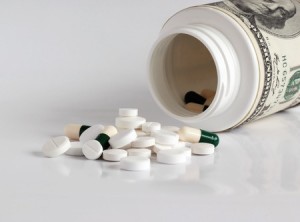2. The Truth About Pharmaceutical Drugs
 Big drug companies spend 19 times more money on marketing than basic research, according to the British Medical Journal.[1]
Big drug companies spend 19 times more money on marketing than basic research, according to the British Medical Journal.[1]
They want to make everyone believe that all your problems in life — from depression to anxiety — are caused by a mysterious “chemical imbalance” in your brain. (Which there has never been any scientific proof for despite all the TV advertisements.[2])
And guess what the cure to all these “imbalances” are? You guessed it. Popping their expensive pills, often for years, often with dangerous side effects.[3]
And here’s another secret: these drugs will NEVER ever cure your social anxiety. They’re not designed to. If you’re lucky to find one that works for you, it will just make you feel better for a few hours temporarily. And if you ever stop taking it, you’re right back to where you started. Maybe that’s why anxiety medication is a $17.3 billion dollar a year industry.[4]

The pharmaceutical industry has no interest in curing diseases. The eradication of any disease inevitably destroys a multi-billion dollar market of prescription drugs. Therefore, pharmaceutical drugs are primarily developed to relieve symptoms, but not to cure.
To be fair, doctors simply don’t have the time to investigate alternatives for their patients. And sometimes medications do help people manage their anxiety by feeling better. But there is no permanent relief to be found in pharmaceutical drugs.
To eliminate your social anxiety permanently, you need to get rid of the real biological cause of it. That brings me to the 3rd tip…
NOTE: This is not medical advice. No one should stop taking psychiatric drugs without doctor supervision.
References:
- Light, D. W., & Lexchin, J. R. (2012). Pharmaceutical research and development: what do we get for all that money? British Medical Journal, 345(aug07 1), e4348–e4348. doi:10.1136/bmj.e4348
- Greenberg, Gary. “The Psychiatric Drug Crisis.” The New Yorker. N.p., 9–3 2013. Web. 15 Feb. 2015.
- Anti Anxiety drug side effects | CCHR International. (n.d.). Retrieved February 15, 2015, from http://www.cchrint.org/psychiatric-drugs/antianxietysideeffects/
- BCC Research Report. (2010). Therapies for Depressive and Anxiety Disorders (No. PHM056A). Retrieved from http://www.bccresearch.com/market-research/pharmaceuticals/therapies-depression-anxiety-phm056a.html
